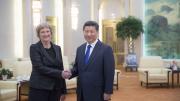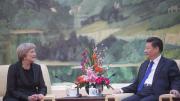President Drew Faust, visiting Beijing for a "Your Harvard" event and other University business, met on Monday night with People's Republic president Xi Jinping. The meeting, Faust's invitation to Xi to visit Harvard, and her planned address at Tsinghua University tomorrow at which she will focus on climate change (see below for more information on Harvard-Tsinghua work on global warming), were described in this University announcement:
Harvard President Drew Faust met Monday evening in Beijing with Chinese President Xi Jinping. The two leaders discussed a number of issues of mutual importance for China and Harvard, including efforts to combat the threat of climate change and continuing collaborations among faculty and scholars. President Faust also invited President Xi to visit Harvard during one of his future visits to the United States.
President Faust, who is scheduled to give an address on the role of universities in addressing climate change at Tsinghua University on Tuesday morning, highlighted the important work being undertaken by faculty and students at Harvard and at institutions across the globe to develop substantive technological and policy solutions to this global challenge. Last year, President Xi signed an historic climate change agreement with United States President Barack Obama.
"I was very pleased by the opportunity to meet with President Xi to discuss several global challenges of mutual concern and interest to both the Chinese government, under his leadership, and to Harvard University, through the research and teaching of our faculty and students," President Faust said. "Addressing climate change, educating the next generation of leaders and supporting faculty research across disciplines into a host of problems facing China and the world are issues of deep mutual interest. They are also areas in which Harvard's faculty and students can fruitfully collaborate with scholars and policy makers in China over the coming years."
“We look forward to welcoming President Xi to Harvard,” Faust continued. “It is through continuous dialogue and exchanges of information and views that can we can make progress on the issues that are important to our University, to the people of China, and to the world.”
During the protracted debate over demands that the University divest endowment assets invested in fossil-fuel companies (Faust and the Corporation have rejected that course of action), Faust has emphasized Harvard's role in conducting research, across disciplines, to address the problem of climate change. At the Beijing Your Harvard event (one of a series held around the world as part of the outreach for The Harvard Campaign, each featuring an address by the president and a discussion or presentations by faculty panelists), she was accompanied by, among others, professor of architectural technology Ali Malkawi, founding director of the Harvard Center for Green Buildings and Cities, funded by Evergrande Group, one of China’s largest real-estate developers. That was a clear indication that climate change, and Harvard-China collaborations, were on the academic agenda for this trip. (Evergrande has also established a cooperative research institute with Tsinghua, the opening ceremony for which was held last September.)
Addressing climate change is of mutual interest to China and the United States, the first- and second-ranking emitters of greenhouse gases; President Barack Obama signed an agreement with President Xi last year, with each leader pledging to limit the nations’ emissions during the next two decades. Their agreement was seen as a step toward encouraging action at the international conference on climate change scheduled to take place in Paris this coming December.
Two Decades of Collaborative Climate Research
Harvard researchers and their counterparts at Tsinghua have long cooperated on analyzing problems associated with air pollution in the People’s Republic, and on climate change more generally. The Harvard China Fund made one of its first grants, in 2007, to the School of Engineering and Applied Sciences’ Michael B. McElroy, Butler professor of environmental studies, and Chris Nielsen, executive director of the Harvard China Project, to further their collaboration with Tsinghua to pursue public-health and economic studies of Chinese air-pollution-control policies.
(The project, which continues and involves some two dozen scholars from the two countries, is, in its words, "an interdisciplinary, collaborative research program focused on China’s atmospheric environment. It conducts interdisciplinary, peer-reviewed studies related to air pollution and greenhouse gases (GHG) in China, from root causes in the demand for and supply of energy to power its economy, to the chemistry and transport of pollutants in the atmosphere, to their impacts on human health and agriculture, to how measures to address these hazards might be integrated with equitable international strategies to limit GHG emissions." Updated March 16, 2015, 3:00 p.m.: Read an account of the inception of the project here. Read "A Warming World," McElroy's 1997 Harvard Magazine article on climate change and the role of the United States and China in addressing it.)
Nielsen and colleagues participated in a roundtable discussion of these issues at Tsinghua the following March, during President Faust’s 2008 visit to China. “Greening China,” by Mun S. Ho and Dale Jorgenson, presented some of the China Project’s research on these issues to Harvard Magazine readers in September-October 2008, and Jorgenson discussed climate change and international policy options directly in a more recent feature in the magazine.
There is also a personal tie that might bring President Xi to campus in the future: his daughter, Xi Mingze, is a 2014 graduate of Harvard College. [Editor's note March 16, 2015, 9:00 p.m.: A University observer rightly notes that Harvard as a matter of policy protects student privacy and security by not confirming or commenting on their enrollment status. This sensible policy applies all the more for the children of public figures whose chance to enjoy a regular student experience, and safety, may require extra efforts to secure their privacy.]
Read about President Faust's climate-change address at Tsinghua University on Tuesday, March 17.










